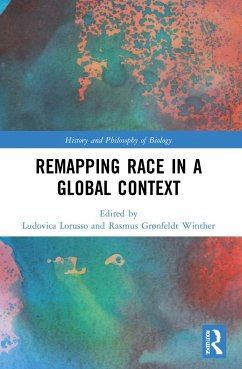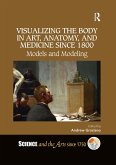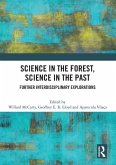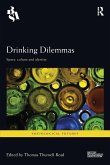Remapping Race in a Global Context
Herausgeber: Lorusso, Ludovica; Winther, Rasmus Grønfeldt
Remapping Race in a Global Context
Herausgeber: Lorusso, Ludovica; Winther, Rasmus Grønfeldt
- Broschiertes Buch
- Merkliste
- Auf die Merkliste
- Bewerten Bewerten
- Teilen
- Produkt teilen
- Produkterinnerung
- Produkterinnerung
Investigating the reality and significance of racial categories, Remapping Race in a Global Context examines the role of race in human genomics, biomedicine, and struggles for social justice around the world.
Andere Kunden interessierten sich auch für
![The Social Context of Ageing The Social Context of Ageing]() Christina VictorThe Social Context of Ageing58,99 €
Christina VictorThe Social Context of Ageing58,99 €![Digital Healthcare and Expertise Digital Healthcare and Expertise]() Claudia EgherDigital Healthcare and Expertise49,99 €
Claudia EgherDigital Healthcare and Expertise49,99 €![Visualizing the Body in Art, Anatomy, and Medicine Since 1800 Visualizing the Body in Art, Anatomy, and Medicine Since 1800]() Visualizing the Body in Art, Anatomy, and Medicine Since 180055,99 €
Visualizing the Body in Art, Anatomy, and Medicine Since 180055,99 €![Science in the Forest, Science in the Past Science in the Forest, Science in the Past]() Science in the Forest, Science in the Past53,99 €
Science in the Forest, Science in the Past53,99 €![Drinking Dilemmas Drinking Dilemmas]() Drinking Dilemmas60,99 €
Drinking Dilemmas60,99 €![Welcome to Our Real Matrix Welcome to Our Real Matrix]() Tom ArantWelcome to Our Real Matrix13,99 €
Tom ArantWelcome to Our Real Matrix13,99 €![Birthing Models on the Human Rights Frontier Birthing Models on the Human Rights Frontier]() Birthing Models on the Human Rights Frontier53,99 €
Birthing Models on the Human Rights Frontier53,99 €-
-
-
Investigating the reality and significance of racial categories, Remapping Race in a Global Context examines the role of race in human genomics, biomedicine, and struggles for social justice around the world.
Produktdetails
- Produktdetails
- Verlag: Taylor & Francis Ltd (Sales)
- Seitenzahl: 326
- Erscheinungstermin: 31. Mai 2023
- Englisch
- Abmessung: 234mm x 156mm x 18mm
- Gewicht: 485g
- ISBN-13: 9781032152707
- ISBN-10: 1032152702
- Artikelnr.: 67823699
- Herstellerkennzeichnung
- Libri GmbH
- Europaallee 1
- 36244 Bad Hersfeld
- gpsr@libri.de
- Verlag: Taylor & Francis Ltd (Sales)
- Seitenzahl: 326
- Erscheinungstermin: 31. Mai 2023
- Englisch
- Abmessung: 234mm x 156mm x 18mm
- Gewicht: 485g
- ISBN-13: 9781032152707
- ISBN-10: 1032152702
- Artikelnr.: 67823699
- Herstellerkennzeichnung
- Libri GmbH
- Europaallee 1
- 36244 Bad Hersfeld
- gpsr@libri.de
Ludovica Lorusso is a Research Fellow at the Universitat Autònoma de Barcelona (UAB). She is the author of peer-reviewed papers in philosophy of biology, philosophy of race, and philosophy of perception, where she proposed a new model of perception of faces. Her current research interests include philosophy of biomedicine, science, technology, and society (STS); and bioethics. Rasmus Grønfeldt Winther is Professor of Humanities at the University of California, Santa Cruz. He works in the philosophy of science and philosophy of biology and has interests in epistemology and political philosophy, cartography and GIS, and science in general. Recent publications include "A Beginner's Guide to the New Population Genomics of Homo sapiens: Origins, Race, and Medicine" in The Harvard Review of Philosophy; "Mapping the Deep Blue Oceans" in The Philosophy of GIS; When Maps Become the World (2020); and Our Genes: A Philosophical Perspective on Human Evolutionary Genomics (2022).
Introduction: Remapping Race in a Global Context
Part I: Lewontin (1972), 50 Years Later
1. Lewontin (1972)
2. Human Genetic Diversity: Lewontin's Fallacy, 20 Years Later
3. Human Genetic Diversity: Fact and Fallacy
4. Racial Classification Without Race: Edwards' Fallacy
Part II: Indigeneity, the Americas, and Colonialism
5. Genomics, Bio-prospecting, Indigeneity
6. Latino STEM Teachers, DACA, and the Future of Teaching
7. Decolonizing the Curriculum in the American Southwest: The Role of
Education in the Maintenance of the Colonial Hierarchy
8. Inclusion Without Equity: The Need to Empower Indigenous Genomic Data
Sovereignty in Precision Health
Part III: On the Biological Non-Reality of Race
9. Modern Population Genetics and Race
10. The Biological Reality of Race: What is at Stake?
11. New Work for a Critical Metaphysics of Race
Part IV: On the Biological Reality of Race
12. A Metaphysical Mapping Problem for Race Theorists and Human Population
Geneticists
13. Five Advantages of the Phylogenetic Race Concept
Part V: Race and Medicine
14. The Biopolitics of Race Revisited
15. Social "Races" in Biomedical Settings
16. Race as Witchcraft. An Argument Against Indiscriminate Eliminativism
about Race
Postscript: Race: The Story Without End
Part I: Lewontin (1972), 50 Years Later
1. Lewontin (1972)
2. Human Genetic Diversity: Lewontin's Fallacy, 20 Years Later
3. Human Genetic Diversity: Fact and Fallacy
4. Racial Classification Without Race: Edwards' Fallacy
Part II: Indigeneity, the Americas, and Colonialism
5. Genomics, Bio-prospecting, Indigeneity
6. Latino STEM Teachers, DACA, and the Future of Teaching
7. Decolonizing the Curriculum in the American Southwest: The Role of
Education in the Maintenance of the Colonial Hierarchy
8. Inclusion Without Equity: The Need to Empower Indigenous Genomic Data
Sovereignty in Precision Health
Part III: On the Biological Non-Reality of Race
9. Modern Population Genetics and Race
10. The Biological Reality of Race: What is at Stake?
11. New Work for a Critical Metaphysics of Race
Part IV: On the Biological Reality of Race
12. A Metaphysical Mapping Problem for Race Theorists and Human Population
Geneticists
13. Five Advantages of the Phylogenetic Race Concept
Part V: Race and Medicine
14. The Biopolitics of Race Revisited
15. Social "Races" in Biomedical Settings
16. Race as Witchcraft. An Argument Against Indiscriminate Eliminativism
about Race
Postscript: Race: The Story Without End
Introduction: Remapping Race in a Global Context
Part I: Lewontin (1972), 50 Years Later
1. Lewontin (1972)
2. Human Genetic Diversity: Lewontin's Fallacy, 20 Years Later
3. Human Genetic Diversity: Fact and Fallacy
4. Racial Classification Without Race: Edwards' Fallacy
Part II: Indigeneity, the Americas, and Colonialism
5. Genomics, Bio-prospecting, Indigeneity
6. Latino STEM Teachers, DACA, and the Future of Teaching
7. Decolonizing the Curriculum in the American Southwest: The Role of
Education in the Maintenance of the Colonial Hierarchy
8. Inclusion Without Equity: The Need to Empower Indigenous Genomic Data
Sovereignty in Precision Health
Part III: On the Biological Non-Reality of Race
9. Modern Population Genetics and Race
10. The Biological Reality of Race: What is at Stake?
11. New Work for a Critical Metaphysics of Race
Part IV: On the Biological Reality of Race
12. A Metaphysical Mapping Problem for Race Theorists and Human Population
Geneticists
13. Five Advantages of the Phylogenetic Race Concept
Part V: Race and Medicine
14. The Biopolitics of Race Revisited
15. Social "Races" in Biomedical Settings
16. Race as Witchcraft. An Argument Against Indiscriminate Eliminativism
about Race
Postscript: Race: The Story Without End
Part I: Lewontin (1972), 50 Years Later
1. Lewontin (1972)
2. Human Genetic Diversity: Lewontin's Fallacy, 20 Years Later
3. Human Genetic Diversity: Fact and Fallacy
4. Racial Classification Without Race: Edwards' Fallacy
Part II: Indigeneity, the Americas, and Colonialism
5. Genomics, Bio-prospecting, Indigeneity
6. Latino STEM Teachers, DACA, and the Future of Teaching
7. Decolonizing the Curriculum in the American Southwest: The Role of
Education in the Maintenance of the Colonial Hierarchy
8. Inclusion Without Equity: The Need to Empower Indigenous Genomic Data
Sovereignty in Precision Health
Part III: On the Biological Non-Reality of Race
9. Modern Population Genetics and Race
10. The Biological Reality of Race: What is at Stake?
11. New Work for a Critical Metaphysics of Race
Part IV: On the Biological Reality of Race
12. A Metaphysical Mapping Problem for Race Theorists and Human Population
Geneticists
13. Five Advantages of the Phylogenetic Race Concept
Part V: Race and Medicine
14. The Biopolitics of Race Revisited
15. Social "Races" in Biomedical Settings
16. Race as Witchcraft. An Argument Against Indiscriminate Eliminativism
about Race
Postscript: Race: The Story Without End









